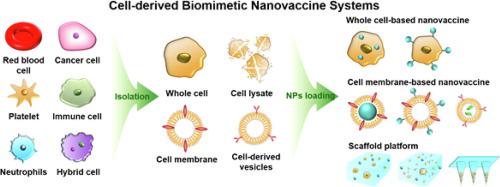Advanced Drug Delivery Reviews ( IF 15.2 ) Pub Date : 2022-01-04 , DOI: 10.1016/j.addr.2021.114107 Zhouqi Meng 1 , Yaojia Zhang 1 , Xuanfang Zhou 1 , Jiansong Ji 2 , Zhuang Liu 1

|
Cancer nanovaccines as one of immunotherapeutic approaches are able to attack tumors by stimulating tumor-specific immunological responses. However, there still exist multiple challenges to be tackled for cancer nanovaccines to evoke potent antitumor immunity. Particularly, the administration of exogenous materials may cause the off-target immunotherapy responses. In recent years, biomimetic nanovaccines by using cell lysates, cell-derived nanovesicles, or extracted cell membranes as the functional components have received extensive attention. Such nanovaccines based on cell-derived components would show many unique advantages including inherent biocompatibility and the ability to trigger immune responses against a range of tumor-associated antigens. In this review article, we will introduce the recent research progresses of those cell-derived biomimetic nanovaccines for cancer immunotherapy, and discuss the perspectives and challenges associated with the future clinical translation of these emerging vaccine platforms.
中文翻译:

用于癌症免疫治疗的具有细胞衍生成分的纳米疫苗
作为免疫治疗方法之一的癌症纳米疫苗能够通过刺激肿瘤特异性免疫反应来攻击肿瘤。然而,癌症纳米疫苗在激发有效的抗肿瘤免疫方面仍然存在诸多挑战。特别是,外源性材料的施用可能导致脱靶免疫治疗反应。近年来,以细胞裂解物、细胞衍生的纳米囊泡或提取的细胞膜为功能成分的仿生纳米疫苗受到广泛关注。这种基于细胞衍生成分的纳米疫苗将显示出许多独特的优势,包括固有的生物相容性和触发针对一系列肿瘤相关抗原的免疫反应的能力。在这篇评论文章中,











































 京公网安备 11010802027423号
京公网安备 11010802027423号